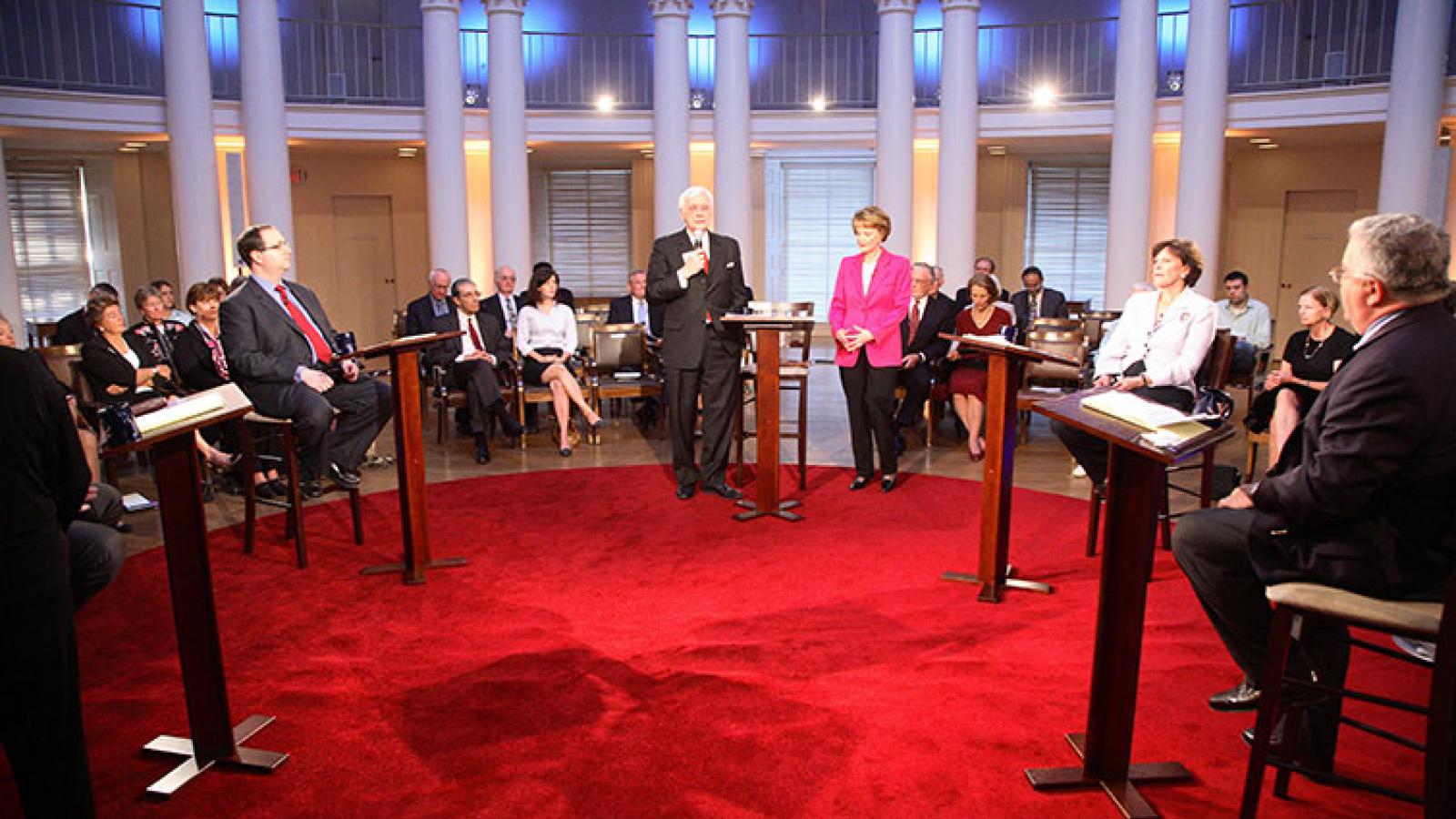Iraq: National Discussion and Debate Series
The National Discussion and Debate Series' premiere debate took place Tuesday, Sept. 18, 2007, in the historic Dome Room of the University of Virginia Rotunda in Charlottesville, Virginia.
Resolved: Keeping troops in Iraq is vital for America's national interests in the Middle East
Arguing for the resolution:
Frederick W. Kagan
Resident Scholar, American Enterprise Institute
Frederick W. Kagan is a resident scholar in defense and security policy studies at the American Enterprise Institute. He is the author of Choosing Victory: A Plan for Success in Iraq, a report by the Iraq Planning Group at AEI. His most recent book is Finding the Target: The Transformation of American Military Policy (Encounter Books, 2006).
Previously an associate professor of military history at the U.S. Military Academy at West Point, Mr. Kagan is the author of The End of the Old Order: Napoleon and Europe, 1801-1805 (Da Capo, 2006) and co-author of While America Sleeps: Self-Delusion, Military Weakness, and the Threat to Peace Today (St. Martin's Press, 2000). A contributing editor at The Weekly Standard, he has also written numerous articles on defense and foreign policy issues for Foreign Affairs, the Wall Street Journal, Washington Post, Los Angeles Times, Policy Review, Commentary magazine, Parameters, and other periodicals.
Ambassador Chas W. Freeman, Jr.
President, Middle East Policy Council
Before becoming President of the Middle East Policy Council in 1997, Ambassador Freeman served as Assistant Secretary of Defense for International Security Affairs (1993-94), earning the Pentagon's highest public service awards for participating in designing a NATO-centered post-Cold War European security system and reestablishing defense and military relations with China. He was U.S. Ambassador to Saudi Arabia during operations Desert Shield and Desert Storm, and Principal Deputy Assistant Secretary of State for African Affairs while the U.S. mediated Namibian independence from South Africa and Cuban troop withdrawal from Angola.
Ambassador Freeman served as Deputy Chief of Mission and Chargé d'Affaires in the American embassies in both Bangkok (1984-86) and Beijing (1981-84). He was Director for Chinese Affairs at the State Department (1979-81), and the principal American interpreter during President Nixon's 1972 China visit. He has also served in India.
Ambassador Freeman is the author of The Diplomat's Dictionary (Revised Edition) and Arts of Power, both published by the United States Institute of Peace in 1997.
Arguing against the resolution:
Reuel Marc Gerecht
Resident Fellow, American Enterprise Institute
Since September 11, 2001, Middle East affairs expert Reuel Marc Gerecht has focused on Iran, Iraq, and Afghanistan, as well as on terrorism and intelligence. He is the author of Know Thine Enemy: A Spy's Journey into Revolutionary Iran (Farrar, Straus & Giroux, 1997) and The Islamic Paradox: Shiite Clerics, Sunni Fundamentalists, and the Coming of Arab Democracy (AEI Press, 2004). He is a contributing editor for The Weekly Standard and a correspondent for The Atlantic Monthly, as well as a frequent contributor to publications including the Wall Street Journal, New York Times, Washington Post, International Herald Tribune, The New Republic, Foreign Affairs, Foreign Policy, and the Middle East Quarterly. Mr. Gerecht formerly served as Director of the Middle East Initiative for the Project for the New American Century, and as a Middle East specialist in the Central Intelligence Agency.
Jessica Tuchman Mathews
President, Carnegie Endowment for International Peace
Jessica Mathews became President of the Carnegie Endowment in 1997. She has experience working in the Executive and Legislative branches, nonprofit management and research, and journalism.
Ms. Mathews was a senior fellow at the Council on Foreign Relations (1993-97), directing its Washington program. She was the founding Vice President and Director of Research at the World Resources Institute (1982-93), an internationally known center for policy research on environmental and natural-resource management issues.
As a member of the Washington Post's editorial board (1980-82), she covered issues including energy, environment, science, technology, arms control, and health. She later became a weekly Post columnist, whose column appeared in the International Herald Tribune.
Ms. Mathews was Director of the Office of Global Issues of the National Security Council (1977-79), focusing on nuclear proliferation, conventional arms sales policy, chemical and biological warfare, and human rights. In 1993, she returned to government as Deputy to the Undersecretary of State for Global Affairs.
Moderator: Margaret Warner
Senior Correspondent, The NewsHour with Jim Lehrer. Margaret Warner is one of three senior correspondents joining Jim Lehrer on PBS's nightly news program, The NewsHour with Jim Lehrer.
Ms. Warner also is one of four co-anchors of America Abroad, a new hour-long radio program devoted to foreign affairs that airs on 90 public radio stations through Public Radio International (PRI).
She joined The NewsHour in 1993 after an award-winning career in print journalism focusing on foreign affairs and domestic politics. She spent ten years at Newsweek - first as a political and campaign correspondent, then as a White House reporter, and finally as chief diplomatic correspondent during four tumultuous years that saw the end of the Cold War, the collapse of the Soviet Union and the first Gulf War. Previously, she was a reporter for the Wall Street Journal, the San Diego Union and The Concord (N.H.) Monitor.
